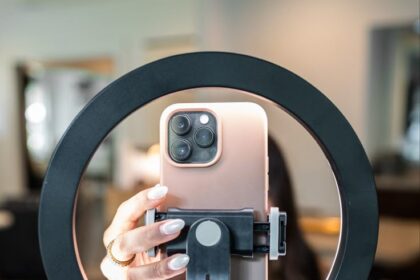The first breeze of fall had just arrived, and that could only mean one thing. It was time to rewatch Gilmore Girls. I’ve long lost count of how many times I’ve gone back to Stars Hollow. In a similar vein, I’ve rewatched F.R.I.E.N.D.S so frequently that I can mimic the dialogue before the characters do. But something shifted recently. When Matthew Perry passed away, I couldn’t bring myself to press play again. Watching it felt different, like visiting an old friend who wasn’t there anymore. I’ve always been a rewatcher. And I’m not alone. Across Pakistan, Gen Z is rewatching comfort shows obsessively. Whether it’s The Office, Grey’s Anatomy, or K-dramas, we return to familiar stories like they’re emotional oxygen masks. The question is: are we watching to relax… or to cope?
Are we watching or coping
Why We Rewatch
Rewatching the same shows isn’t laziness. It’s survival. When the world outside feels unstable, predictable narratives offer what we crave most. Control is the most sought-after element. The same jokes, the same endings, and the same faces remain constant. Watching them isn’t just entertainment. It’s self-soothing. And it’s not just theory. A 2024 study in Lahore found students used rewatching to “divert from stress, escape boredom, and feel emotionally connected.” That emotional connection isn’t fake. It’s what researchers call social surrogacy. We treat fictional characters as stand-ins for real friends. For Gen Z in Pakistan, this makes too much sense. We’re the most online, overstimulated, and ironically the most emotionally isolated generation the country has seen. Shoes feel stable when nothing else does.
Being Gen Z in Pakistan for Gilmore Girls
To understand why we rewatch obsessively, we have to understand what we grew up with. We are a generation raised on uncertainty. We grew up in the post-9/11 era, experiencing energy crises, political upheaval, terror threats, inflation surges, the COVID-19 pandemic, and the current climate collapse. Our nervous systems never got a break. Add in economic mess, gendered expectations, academic pressure, and the suffocating rules of desi respectability, and you get a generation that doesn’t just want escape but needs it. Therapy isn’t accessible. Discussing feelings remains stigmatised. Most of us are told to “pray it away” or “stop being dramatic.” So instead, we turn to Lorelai Gilmore or Joey Tribbiani. At least they let us laugh, cry, or just feel without judgement. Pakistani researchers even found binge-watching linked to insomnia and emotional dysregulation in Gen Z. We’re literally losing sleep over coping cycles that start with stress and end in rewatch spirals at 2 a.m. The effect isn’t just comfort. It’s digital numbing.
Comfort Is Chemical Comfort
TV isn’t only psychological. It’s biochemical. When you rewatch a show, your brain already knows what’s coming. That familiarity lowers cognitive load; you don’t have to process anything new. For a brain burnt out by exams, family chaos, or doom-scrolling headlines, that ease is irresistible. Each time your favourite scene plays, your brain gives you dopamine. You’re not addicted to the show itself; you’re addicted to how it makes you feel. Psychologist Krystine Batcho links this phenomenon to nostalgia, which reduces loneliness and boosts serotonin. That’s why you laugh at a Chandler Bing one-liner for the 12th time. This isn’t due to the novelty of the moment. But because, for those five seconds, your brain forgets everything else. It feels safe. Familiar. You’re not spiralling. That’s not just comfort. That’s neurochemical survival.
Parasocial Grief
There’s something embarrassing about how much we cling to fictional characters. You may come to understand the rarity of emotional intimacy in our lives. We grew up in families that taught us how to be strong, not how to feel. We learnt how to suppress, smile, and then move on. So when Cristina Yang said, “Don’t let what he wants eclipse what you need,” we felt seen. When Rory Gilmore flopped her way through her 20s, we felt forgiven. These one-sided relationships are called parasocial bonds. And for Gen Z in Pakistan, they’ve often been the only models for naming feelings or dealing with conflict. A Lahore study even found that unsupported students were more likely to form deep parasocial ties with fictional characters. So when Matthew Perry died, we weren’t just mourning a celebrity. We were mourning Chandler. Chandler was our sarcastic best friend, guiding us through breakups, depressive spirals, and sleepless nights. His death forced us to confront the fact that the scaffolding we leaned on was never real to begin with. As media psychologist Gayle Stever put it, “We grieve parasocial losses not because the relationship was mutual but because the comfort it gave us was real.”
Are We Watching or Avoiding to watch Gilmore Girls?
There’s nothing wrong with rewatching Gilmore Girls every fall. It’s perfectly acceptable to shed tears over the same episode of BoJack Horseman. It’s human. It’s tender. It’s how we survive when the world feels unwatchable. But maybe we need to ask, what are we trying not to feel when we press play again? Are we watching to heal, or are we just numbing? Because comfort that turns into avoidance becomes a loop. And when we stay stuck in loops, we never give ourselves the chance to write new stories. Our own. This isn’t about cancelling your comfort rituals. Some days those characters feel more like home than anything outside your screen. But maybe it’s about becoming conscious of when we lean on them and why. So next time you feel the urge to rewatch for the fifth time, pause. Ask yourself: is this nostalgia, or am I avoiding something? And if the answer is both, that’s okay. We’re not weak for needing softness. But we deserve more than just survival disguised as familiarity. Perhaps it is time to cease viewing television as a mere distraction and instead recognise it as a reflection of society. The characters didn’t change. We did. And maybe it’s time we let them go to see what happens next.













